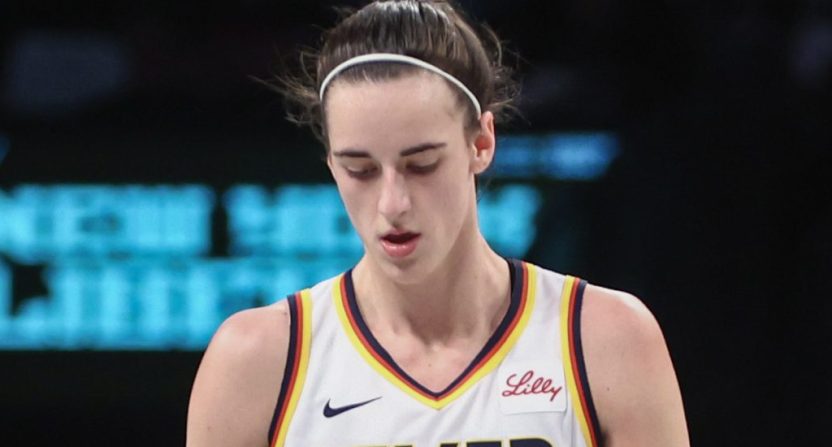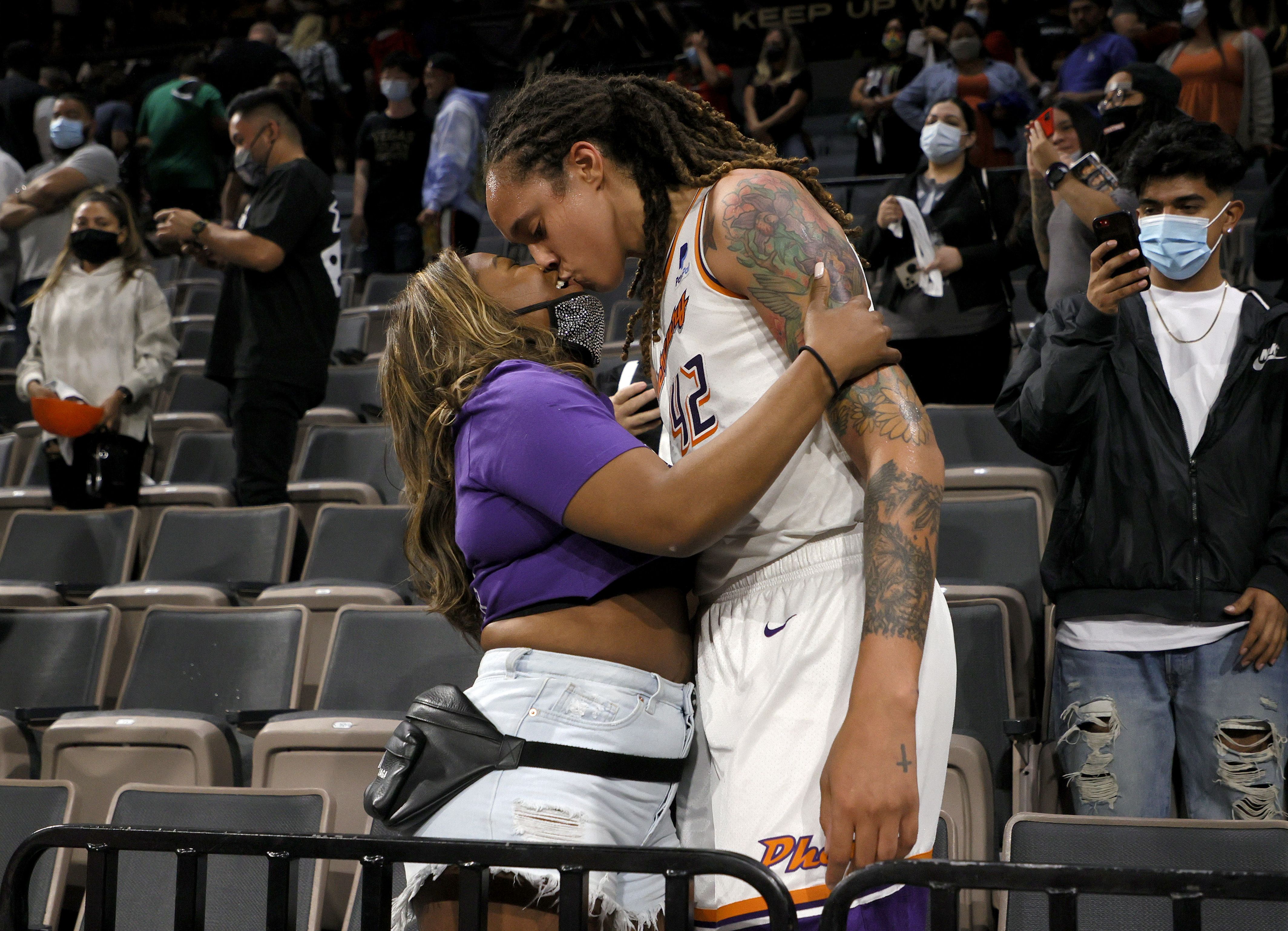Recently, sports commentator Clay Travis sparked controversy with a provocative statement regarding the WNBA and its perceived treatment of NCAA star Caitlin Clark. In a bold and inflammatory claim, Travis suggested that WNBA players may be discriminating against Clark because she plays in a “black lesbian league,” a comment that has been met with widespread criticism and backlash from both sports fans and analysts alike.
Travis, known for his often controversial opinions, made this assertion in the midst of an ongoing conversation about Clark’s rise in women’s basketball. The Iowa star has become a dominant figure in college basketball, known for her exceptional skills, sharp shooting, and ability to lead her team to victory.
With her growing popularity, it’s only natural that the basketball world, including the WNBA, has taken notice of her talents. However, according to Travis, there is a deeper, more problematic reason why some in the WNBA may not fully embrace Clark’s success.

In Travis’ view, the WNBA’s alleged discrimination stems from Clark’s association with NCAA basketball, a league he claims is predominantly white and straight, in contrast to the WNBA, which he claims is defined by its “black” and “lesbian” makeup.
While the premise of his statement is highly problematic and dismissive of both the WNBA’s athletes and the larger issues of race and sexuality in sports, it also reveals the deeper cultural divide that sometimes exists between different leagues within the world of women’s basketball.
Let’s break down what Travis is implying and why his remarks are so controversial. The claim that WNBA players, most of whom are black and many of whom are openly queer, would discriminate against Caitlin Clark because of her association with a “white, straight” league is a gross oversimplification of the dynamics at play in both women’s basketball and broader society.
It suggests that identity factors like race and sexuality are the sole determinants of how athletes are treated and perceived, ignoring the much more complex realities of skill, competition, and personal achievements in sports.

Caitlin Clark’s talent speaks for itself. She has broken records, led her team to a national championship, and earned accolades from both fans and critics. Yet Travis seems to be suggesting that her success in college basketball is somehow at odds with the culture of the WNBA, simply because of the players’ backgrounds.
The underlying message seems to be that Clark’s rise is being hindered by her perceived “outsider” status in the world of women’s basketball, not because of any shortcomings on her part as a player, but because of the alleged disconnect between her identity and the identity of WNBA athletes.
Critics of Travis’ comments argue that this line of thinking only serves to perpetuate unnecessary divisions in women’s basketball. The reality is that the WNBA has long been a pioneering league for diversity and inclusion, and its players represent a wide range of racial, ethnic, and sexual identities.
Players like Sue Bird, Diana Taurasi, and Angel McCoughtry have achieved superstardom for their skill on the court, and the WNBA has been a safe space for athletes who may not always feel accepted in other corners of the sports world. To label the league as a “black lesbian league” is reductive and dismissive of the women who have dedicated their lives to playing the sport at the highest level.

Travis’ comments also ignore the fact that discrimination in sports—especially in women’s sports—is far more complicated than simply a conflict of identities. The WNBA, like many other professional leagues, has faced its own struggles for recognition and respect, battling stereotypes, unequal pay, and underrepresentation in media.
Rather than casting blame on individual players or assuming that the WNBA’s players are actively excluding Caitlin Clark for identity-based reasons, it’s more productive to discuss the larger systemic issues that affect women’s basketball as a whole.
News
“So happy…” Justin Bieber speaks out about his relationship with Cardi B after romantic video leaks – The truth is revealed about Haley Bieber’s recent unfollows!
In an explosive turn of events, pop sensation Justin Bieber has broken his silence regarding his relationship with rapper Cardi B after a leaked romantic video of the two sparked rumors of an affair, leaving fans, media, and even his…
BREAKING NEWS: Worldwide chaos erupted last night when Elon Musk released the uncensored list and pictures of all the stars involved with Diddy: ‘Everyone has the right to know.’
In a dramatic turn of events, the entertainment world was rocked last night by Elon Musk’s unexpected release of an uncensored list and accompanying pictures detailing the connections between various celebrities and music mogul Sean “Diddy” Combs. This revelation has…
BROKEN MIRROR MENDED: Cardi B and Offset’s apology night turns into a disaster and Cardi B smashes a wine bottle on Offset’s head
In what was supposed to be a quiet evening of reconciliation, Cardi B and Offset’s much-anticipated apology nightturned into a dramatic spectacle that left fans and media outlets buzzing with surprise. The couple, who have weathered many storms in the public eye, had announced…
“I’m the happiest person”: Asap Rocky couldn’t hide his joy when he revealed that his wife, Rihanna, is eight weeks pregnant with twins. He shared 9 special quotes about his wife, making people not only share their joy but also moved to tears.
LOS ANGELES, CALIFORNIA — In a world where celebrity headlines are often filled with scandal or speculation, one story is warming hearts across the globe: A$AP Rocky has announced that Rihanna, his wife and global music icon, is eight weeks pregnant —…
I CAN’T TAKE IT ANYMORE 🤕 CARDI B SHOCKS 8 WORDS AT KIM KARDASHIAN AFTER ANNOUNCEDING HER WITHDRAWAL FROM SHOWBIZ FOR UNEXPECTED REASONS
In a world where celebrity news often dominates headlines, Cardi B’s recent announcement has sent shockwaves through the entertainment industry. Known for her bold personality and chart-topping hits, Cardi B has always been a force to be reckoned with. However,…
“EVERYTHING IS OVER”ASAP ROCKY speaks for the first time about life after retirement, revealing two SHOCKING words about his family that surprised everyone.
In a candid and heartfelt interview, A$AP Rocky recently shared insights into his life after retirement, offering fans a glimpse into his personal world. Known for his dynamic presence in the music industry and his influential style, A$AP Rocky has…
End of content
No more pages to load











